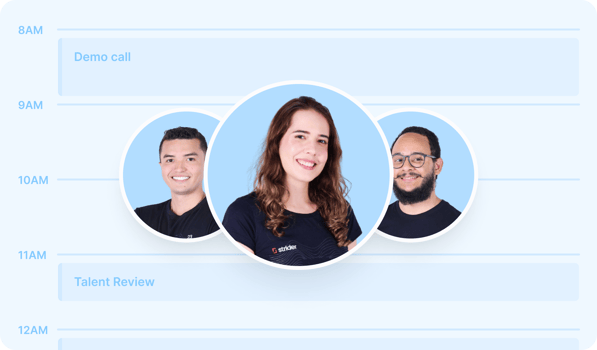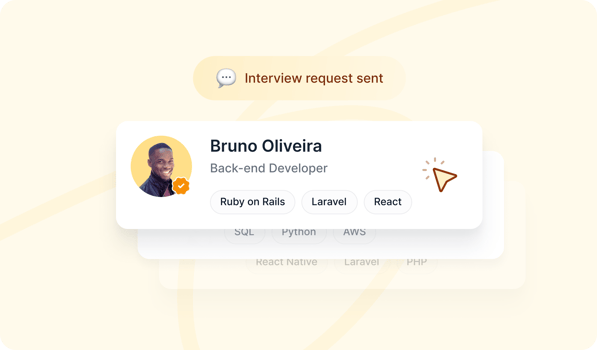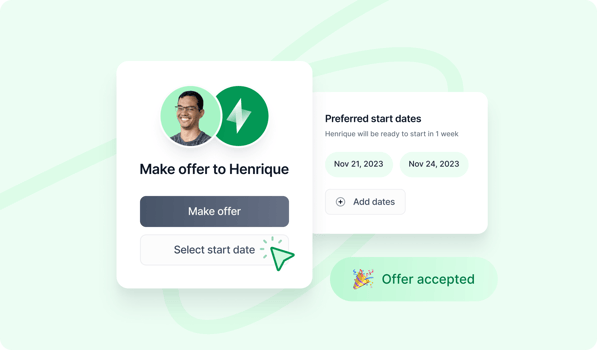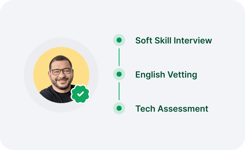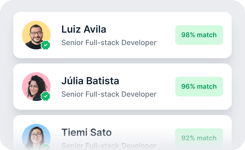Hire Remote Full Stack Developers Effectively in 2025
The demand for full-stack developers has steadily increased in today's fast-paced and technology-driven world. These versatile professionals possess many skills and knowledge, making them invaluable assets for companies looking to develop and maintain complex web applications.
A full-stack developer is a developer proficient in front-end and back-end technologies, meaning they can work on all aspects of a web application, from designing the user interface to managing databases and server-side logic. This comprehensive skill set allows them to handle a web development project independently and contribute to all stages of the development process. A full stack web developer can bridge the gap between design and functionality, improving communication across teams and speeding up development timelines. Their adaptability is invaluable as they can shift gears quickly as project needs change. A full stack web developer can manage both server-side operations and user interfaces; they make it easier for your systems to scale and handle increased user traffic smoothly. As a result, you can reduce the need for multiple specialists, saving both time and money.
However, finding and hiring the right full-stack developers can take time for many companies. The job market is highly competitive, and a dedicated full-stack developer is in high demand. Adopting strategies that attract top talent and evaluating candidates effectively is important to ensure an effective hiring process.
This article will explore key considerations and best practices when you hire a full stack developer. Whether you are a startup looking to build your development team or an established company seeking to expand your tech workforce, these insights will help you streamline your hiring process and secure the right talent for your organization's needs.
What to Look for When You Hire a Full Stack Developer
Technical skills
When evaluating the technical skills of a proficient full-stack developer, it's important to look for a strong foundation in front-end and back-end technologies. On the front-end side, they should be proficient in HTML, CSS, and JavaScript, with a solid understanding of responsive web design principles. Additionally, knowledge of popular front-end frameworks like React, Angular, or Vue.js is highly desirable.
Regarding back-end technologies, full-stack developers should have expertise in server-side programming languages, such as Python, Ruby, Java, or Node.js. They should be well-versed in working with databases and have experience with query languages like SQL. Familiarity with back-end frameworks such as Django, Ruby on Rails, Spring, or Express.js is also valuable.
Furthermore, a strong understanding of web development concepts, such as RESTful APIs, version control systems (e.g., Git), and testing frameworks, is indispensable. When you hire dedicated full stack developers, they should also be familiar with cloud platforms like AWS, Azure, or Google Cloud and know about deploying and managing web applications in production environments.
Communication Skills
In addition to technical capability, effective communication skills are vital for full-stack developers. They must effectively collaborate with team members, understand project requirements, and communicate their ideas and solutions. Strong verbal and written communication skills enable them to articulate complex technical concepts to technical and non-technical stakeholders.
Full-stack engineers should also possess active listening skills, allowing them to understand client needs and translate them into actionable development tasks. They should be able to ask clarifying questions, provide updates on progress, and offer solutions to challenges that arise during the development process. Working in agile and collaborative environments and effectively communicating with designers, project managers, and other team members is essential for success.
DevOps Practices and Tools
In the rapidly evolving world of full-stack development, developers should understand DevOps practices and tools well. DevOps focuses on the collaboration and integration between development and operations teams, aiming to automate and streamline the software delivery process.
When you hire a full stack developer, they must be proficient in tools like Docker for containerization, Kubernetes for orchestration, and continuous integration/continuous deployment (CI/CD) pipelines are valuable. Knowledge of configuration management tools like Ansible or Chef and experience with infrastructure-as-code using tools like Terraform can also be advantageous. Highly skilled developers who are well-versed in DevOps practices can contribute to building scalable and resilient applications, ensuring smooth deployment and maintenance processes.
Security Considerations
With the increasing number of cyber threats, security is a critical aspect of web development. Full-stack developers should understand web application security best practices to protect sensitive data and prevent potential vulnerabilities. They should be familiar with common security threats, such as cross-site scripting (XSS), SQL injection, and cross-site request forgery (CSRF), and know how to implement proper security measures to mitigate these risks.
Knowledge of authentication and authorization mechanisms, such as OAuth or JSON Web Tokens (JWT), is important for developing secure user authentication systems. Additionally, understanding safe coding practices and adhering to industry standards, such as OWASP (Open Web Application Security Project) guidelines, is essential. An experienced full-stack developer who prioritizes security in their development process can help safeguard the application and ensure data protection.
API Integration Skills
A full stack developer must have the ability to integrate external APIs smoothly. They should be experienced in working with RESTful or GraphQL APIs and adept at managing data flow between the application and third-party services. Whether incorporating payment gateways, social media platforms, or internal business tools, full stack developers must ensure that the integrations are seamless and secure, enhancing the app's overall functionality and scalability. When you hire full stack developers, handling API integrations is necessary for building feature-rich applications.
Testing and Debugging Abilities
A full stack developer needs to have strong testing and debugging abilities. They should be comfortable writing unit tests, integration tests and conducting end-to-end testing to maintain the stability of their applications. Can they use tools like Jest, Mocha, and Cypress for testing alongside debugging tools? Their ability to troubleshoot and resolve issues across the stack establishes a smooth, bug-free application, leading to faster launches and fewer post-production issues. When you hire dedicated full stack developers, their skill in testing and debugging guarantees a stable and reliable product.
Performance Optimization Expertise
Look for a full stack web developer who can optimize both front-end and back-end performance. From compressing images and implementing lazy loading on the front end to optimizing server response times and database queries on the back end, a full stack developer should focus on reducing load times and improving user experience. These performance enhancements make the application run efficiently, even under heavy traffic, directly impacting user satisfaction and business outcomes. When you hire remote full stack developers, their expertise in performance optimization plays an important role in delivering a fast, responsive application.
Scalability Design Skills
A reliable full stack developer understands how to design applications that can grow with the business, including handling more users and data without sacrificing performance. They know both vertical scaling (increasing resources) and horizontal scaling (adding servers), and they are familiar with microservices architecture and load-balancing techniques. Developers with strong scalability design skills future-proof the applications so that they can evolve alongside the business. When you hire full stack developers, their ability to build scalable systems guarantees long-term growth and stability.
UX/UI Sensitivity
While full stack developers primarily focus on functionality, they should also have a solid understanding of user experience (UX) and user interface (UI) principles. Being able to design and develop intuitive, visually appealing interfaces ensures that the end product is both functional and user-friendly. Developers with an eye for design can bridge the gap between development and design teams so that the final product meets both technical and aesthetic standards. When you hire dedicated full stack developers, this skill can enhance overall product quality and user satisfaction.
Top 5 Full Stack Developer Interview Questions
What is the observer pattern?
This question is relevant because it allows you to assess the candidate's understanding of software design principles and their familiarity with common design patterns. By discussing the Observer Pattern, you can evaluate their ability to create loosely coupled components and enable efficient communication and synchronization between them.
A strong answer would demonstrate the candidate's knowledge of how the Observer Pattern can be applied in real-world scenarios, such as implementing event-driven systems or handling data updates in an application.
What is multithreading? How is it used?
Multithreading is a fundamental concept in concurrent programming, and this question helps you evaluate a candidate's knowledge of this topic. By discussing multithreading, you can assess their ability to optimize application performance by executing multiple threads simultaneously within a single process.
Look for candidates who can provide a clear definition of multithreading and explain its benefits in terms of responsiveness and resource utilization. Additionally, they should be able to discuss techniques for managing thread synchronization, avoiding common concurrency issues, and handling shared resources effectively.
How can you prevent a bot from scraping a publicly accessible API?
API security is a critical aspect of web development, and this question allows you to assess a candidate's understanding of API protection. Look for candidates who can discuss various techniques for preventing web scraping, such as rate limiting, CAPTCHAs, or implementing authentication and authorization mechanisms.
A strong answer would demonstrate their knowledge of industry best practices for securing APIs against malicious scraping attempts. Look for candidates who can also discuss challenges related to bot detection and mitigation, and how they would handle such scenarios.
What is inversion of control (IoC)?
Inversion of control (IoC) is an important concept in software development, and discussing it during the interview can help you assess a candidate's familiarity with dependency injection and software architecture patterns. Look for candidates who can explain IoC and its benefits, such as decoupling dependencies and improving testability and maintainability. They should be able to provide examples of IoC frameworks like Spring or Angular and discuss how IoC containers manage object lifecycles and resolve dependencies.
What is a CSS Preprocessor? What are Sass, Less, and Stylus, and why do people use them?
CSS preprocessors are widely used in web development to enhance the capabilities of CSS and make styling more efficient. This question allows you to assess a candidate's knowledge of front-end technologies.
Look for candidates who can explain the concept of CSS preprocessors, such as Sass, Less, and Stylus, and their advantages, such as variables, mixins, and nested styles. They should be able to discuss how preprocessors improve code maintainability, promote reusability, and streamline the styling process.


